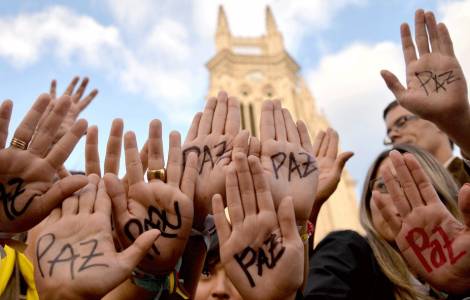
Crisis group
Bogotá (Agenzia Fides) - "Although security in Latin America is still precarious, the first signs of peace are beginning to be registered": this is what emerges from the data in the Global Peace Index 2017 report, received and analyzed by Agenzia Fides. The Global Peace Index is the world’s leading measure of global "peacefulness", produced since 2007 by the Institute for Economics and Peace (IEP), based in New York, ranks 163 countries covering 99.7% of the world’s population. From data analyzed by Fides it emerges that six of the nine regions where the world is divided have improved their peace index. Among them, South America emerges as the fourth most peaceful region in the world. Among the 8 Latin countries that have improved their levels of peace, Chile is ranked 24th in the world, followed by Costa Rica, 34th, and Uruguay, 35th.
On the other side of the list is Colombia, which remains the least secure in Latin America, ranking 146th in the world, ahead of Venezuela (143th) and Mexico (142th).
It should also be noted that the ceasefire and the peace process initiated in Colombia between the Government and FARC have improved the situation, especially with regard to the reduction of the impact of terrorism and the number of deaths due to internal conflicts. Nevertheless, the Country continues to occupy one of the worst positions in the world ranking, as there are still many other open fronts where it is necessary to intervene (see Fides 9/6/2017), such as the activities of other armed groups, drug trafficking, thousands of people who have disappeared.
However, this improvement in Colombia has also affected the situation of neighboring countries, such as Ecuador, where the intensity of organized conflict has been reduced.
Venezuela, for its part, has worsened its instability because of the growing tensions between government and opposition, as well as a profound economic and social crisis. In addition, the many restrictions imposed by the Venezuelan government have increased the risk of social clashes and violent protests since the beginning of the year.
Mexico, in addition to its many internal problems such as widespread crime, has suffered the direct impact of Donald Trump's presidency in the United States, in terms of relations with neighboring countries.
According to the Global Peace Index, in the last decade the fundamental characteristic of countries that experienced a passage to more peaceful situations was their attitude in the field of positive peace (set of attitudes, actions and structures that create and support peaceful societies) .
From the analysis carried out, it is concluded that, under less peaceful conditions, the most important factors to be addressed remain those linked to efficient government, low level of corruption, acceptance of others' rights and good relations with neighbors. Significant factors are also the free circulation of information and a solid business environment.
In order for countries to improve their positions on the GPI scale, it is crucial for policy makers to understand and implement policies that go in this direction, as Pope Francis recalled in his recent trip to Colombia (September 7-10), signaling as essential, for a stable and lasting peace, the need to "take urgent steps towards the common good, equity, justice and respect". (LG) (Agenzia Fides 3/11/2017).